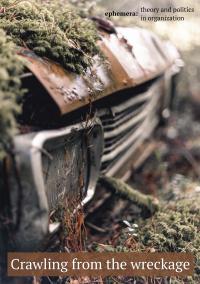resistance
Of mice and man
*Aim of the book
‘What can strike mean for the creative workers, and industrialists, whose punch clocks know no on and off, but only countless versions of on?’ (142). The essay Factories of knowledge, industries of creativity by Gerald Raunig deals with the Occupy movement and today’s forms of existence and production. According to Raunig, the Occupy movement is a temporary ‘reterritorialization’, as a form of resistance in a ‘deterritorialized society’ (13).
‘I’m as much an anarchist in theory as I am in practice’: Fernando Pessoa’s ‘Anarchist banker’ in a management education context
Introduction
‘You mean to say, then, that you are an anarchist in exactly the same way as all those people in workers’ organizations are anarchists? You mean that there’s no difference between you and the men who throw bombs and form trade unions?’
‘Of course there’s a difference, of course there is, but it isn’t the difference that you’re imagining. Do you perhaps doubt that my social theories are different to theirs?’
‘Ah, now I see! In theory; you’re an anarchist, but in practice...’
Practicing militant inquiry: Composition, strike and betting in the logistics workers struggles in Italy
Rethinking the strike, bet on generalization. Here is what we learned from a cycle of struggles in the field of retail logistics in Italy, and specifically warehouse workers at cooperatives managing and organizing the sorting and transport of goods for major brands such as IKEA, the national Coop[1] and for large-scale distribution companies such as TNT Global Express and SDA Express Courier[2].
Crisis, governmentality and new social conflict: Argentina as a laboratory
1. On political dynamism*
The labour of academia
Issue Editors: Nick Butler, Helen Delaney and Martyna Śliwa
Affective capitalism
Issue Editors: Tero Karppi, Anu Laukkanen, Mona Mannevuo, Mari Pajala, Tanja Sihvonen
‘And if I don’t want to work like an artist...?’ How the study of artistic resistance enriches organizational studies
Introduction
And if I don’t try to live like an artist, if I don’t want to work in such a way, being a PREY, AND IN SELF-EXPLOITATION! And if I don’t even think of self-actualizing myself constantly WHAT WILL HAPPEN THEN?! (theatre play by René Pollesch)




